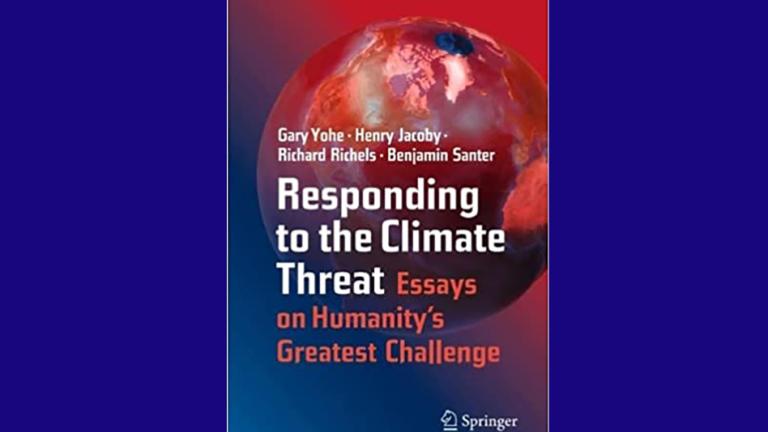Home » Everyday actions » 6 Claims Made by Climate Change Skeptics—and How to Respond

6 Claims Made by Climate Change Skeptics—and How to Respond
Filed Under: Everyday actions | Tagged: Climate Last updated November 1, 2021
A man walks through the mud in San Pedro Sula. Three days after Hurricane Eta hit the Nicaraguan coast as a Category 4 storm, the aftermath of flooding and mudslides has displaced over 350,000 Hondurans. The death toll in Central America is over 100 and expected to rise because of many missing people (Photo by Seth Sidney Berry / SOPA Images/Sipa USA)(Sipa via AP Images)
It’s hard to believe, but apparently more than a few climate change deniers still roam our ever-heating planet. According to a recent study in the esteemed science journal PLOS , people systematically understate their disbelief in human-caused climate change when answering surveys, so skepticism is more prevalent than many of us realize.
Given the urgency of the climate crisis, it’s crucial that we all do our part to educate any doubters we might encounter. That’s why the Rainforest Alliance has compiled six arguments commonly made by climate change deniers, along with science-backed responses you can deploy to convince them of the truth: that climate change is real, accelerating, and that we need to take bold action ASAP.
1. Climate change denier claim: “This is the coldest winter we’ve had in years! So much for global warming.”

There’s a difference between climate and weather: Weather fluctuates day in, day out, whereas climate refers to long term trends—and the overall trend is clearly and indisputably a warming one. While the impacts of climate change have only just begun to hit the Global North, farmers in the tropics have been contending with impacts—from droughts to floods to a proliferation of crop-destroying pests—for years. That’s why the Rainforest Alliance works with farmers to take a climate-smart approach . That means first assessing a farm’s particular climate risks, taking the crop and local ecosystem into account, then finding the right combination of tools to manage the farms climate challenges. That’s what makes climate-smart agriculture “smart.”
2. “Climate change is natural and normal—it’s happened at other points in history.”
It’s true that there have been periods of global warming and cooling—also related to spikes and lulls in greenhouse gases—during the Earth’s long history. But those historic increases in CO 2 should be a warning to us: They led to serious environmental disruptions, including mass extinctions. Today, humans are emitting greenhouse gases at a far higher rate than any previous increase in history . (Before you collapse into a puddle of despair, however, find out about our work to promote natural climate solutions , like community forestry and regenerative agriculture.)
3. “There’s no consensus among scientists that climate change is real.”
Wrong. There is nearly 100 percent agreement among scientists. Moreover, the UN’s Intergovernmental Panel on Climate Change (IPCC) says that global warming is accelerating, and will reach 1.C above pre-Industrial levels around 2030 —a full decade earlier than previously forecast .
Sign up for useful tips to green your life and protect our planet.
4. “Plants and animals can adapt.”
Wrong again. Because human-caused climate change is happening so rapidly, species simply don’t have time to adapt . Frogs tell the story best: With their semi-permeable skin, unprotected eggs, and reliance on external temperatures to regulate their own, they are often among the first species to die off when ecosystems tip out of balance—and they’re dying off in droves. The Rainforest Alliance chose a frog as its mascot more than 30 years ago precisely because it’s a bio-indicator: A healthy frog population signals a healthy ecosystem, which is what we’ve been working to promote—along with thriving communities—since 1987.
5. “Climate change is good for us.”
It’s hard to even know where to begin to address this statement by climate change deniers, especially when you think about the human cost of a warming planet. The evidence points to a clear link between climate change and a surge in modern slavery : When crop failures, drought, floods, or fires wipe out livelihoods and homes, people migrate in the hopes of improving their lot—but can find themselves vulnerable to human trafficking and forced labor and other human rights abuses. And the overall economic cost is staggering: The global economy could lose $23 trillion to climate change by 2050 .
6. “OK, maybe climate change is real, but there’s nothing to be done—it’s too late.”
It’s true that we don’t have a moment to waste, but it’s not too late. If governments, business, and individuals begin taking drastic action now, we can keep warming within the 1.5C target set by the Paris Agreement. What can you do to make sure that happens? A lot. Here are actions you can take —both to make your daily life more sustainable and to push governments and companies to act—to secure a better future.
2022 Was One Of The Hottest Years On Record. Will 2023 Be Worse?

Environment
A cosmic counterargument to the climate change crisis, climate change is real, but does it really matter.
Posted April 13, 2019
In addition to being a writer, I’m also a realtor, and last night I dreamed that one of my real estate clients was teaching a class on climate change and presented several doomsday scenarios about what will happen if global warming continues on its current path. Scenarios included the Earth running extremely low on drinkable water and humans living in makeshift shacks in isolation in the few still-habitable areas. For whatever reason, I mounted two counterarguments to his scenarios. The first is shallow and I’m almost embarrassed to say it, but again, this was a dream so I’m at best only partially responsible for it: I asked him if this scenario would become a reality in the next 40 years or so (I’m in my mid-40’s so I suspect I was selfishly focusing on my own lifespan and trying to gauge how much I needed to worry). His reply was, nobody knows; it could happen sooner or it could happen later. In my dream, I decided not to worry too much about this outcome since, according to the instructor, no one even knows if it’s going to happen in our lifespan. Totally selfish and short-sighted, I know, but again, it was only a dream.
My second counterargument, which I’m now calling the "cosmic counterargument" to climate change, I find more interesting. It wasn’t articulated in words, but rather vague thoughts and sentiments, the essence of which was this: Isn’t it only natural to think that at some point, we as an invasive creature that spread like a cancer on this planet and wreaked havoc on it, will go the way of all the other now extinct species before us, and isn’t it only one step further to reason that we’ll probably take the planet with us? And if we do, since our planet is only one of an estimated 30 billion in our galaxy alone, wouldn’t it be no big deal if one disappeared? Is it just human vanity, or even human sentimentality, to believe that we could or should fight this process of climate change that we set in place so long ago?
Some scientifically-uninformed people have argued over the past decade that global warming is just a natural phase of the mega-process of earth’s cooling and warming over time, that the Earth moves through ice ages and warming trends and that humans have nothing to do with the current warming trend. This argument is, in two words, pretty dumb. There is every reason, both scientific and common sense- wise , to believe that since our species multiplied in the billions and relied on fossil fuel-driven technologies to an extreme, we have altered the air, water, and soil we live in and on. We’ve altered our habitat. Scientists know the current warming trend is more extreme than others in the past. And because we’ve altered our planet and its atmosphere, it’s not crazy to think we can alter it again, in a more positive direction, by reducing our reliance on fossil fuels and moving toward alternative fuel sources. All familiar territory so far.
But my point is different: I wonder if it's not also a natural process for our species and our home to become extinct once we’ve altered it to the extent we have. We know species have come and gone. We know planets and other celestial bodies come and go. For all we know, there may be no other creatures in the galaxy exactly like humans and there may be no other planets exactly like Earth (we lack the required wide-angle view and deep-time perspectives to know for sure) but it’s likely that, just like individual creatures and individual species, planets too come and go, along with whatever inhabitants or unimaginable life-forms are attached to them. Just like human beings, it’s likely that planets and even planetary systems move through birth, life, sickness, and death. So yes, this warming trend is our doing, and yes, it might do us in, but moreover, this whole process might be just a facet of nature.
An image comes to mind of small child stomping on the ground near an ant hill or pouring water into the entrance/exit hole of the ant hill until all the little panicked creatures come rushing out, scrambling to escape the imminent danger. I feel like that’s what we’re doing now in response to global warming, a crisis that we’ve brought upon ourselves with our advances in technology, and the one that scientists predict will most surely do us in, unless... [insert all the familiar arguments].
But it’s curious that scientists are unanimously on board with this call to attention and call to action to stop or at least slow down global warming by all measures possible. I mused the other day while driving my beloved electric car (the Nissan LEAF) that it would be wonderful if the first car had been electric, and we had set ourselves on that path instead. We’re told that there are many factors involved in global warming or climate change, and we’re seeing the results of it with more dynamic weather patterns and more intense storms and yes, sea levels rising and average temperatures rising. We’re all experiencing it either first-hand or by being in touch with what’s going on in the wider world around us. Climate change is no myth. The scientists are right. But isn’t it interesting that scientific experts are leading the charge to Do Something Now when it’s this same group of humans who are clued into just how small and insignificant and fleeting our planet is, because they presumably appreciate, more than anyone, just how teeny we are in our unimaginably vast universe.
Our planet is a speck of dust in an enormous universal dust-bunny. Of all the specks of dust and gas clouds in the vast universe, our busy little planet is but a “pale, blue dot” (to borrow Carl Sagan’s famous moniker for Earth). Planetary bodies come and go. Stars are born and burn up. Meteors travel through space and transform into nothingness. So, is it just human vanity or sentimentality (who knew scientists were the sentimental ones?) to believe that we can, or even that we should, take all possible action to stop what could be a very natural process: the natural life span of one little speck of dust in the universe? I don’t mean this post to be depressing or morbid. Again, it was just a dream, and I thought it was interesting.

Liz Swan, Ph.D. , is a writer and philosopher who teaches writing at the University of Colorado Boulder. She enjoys writing about all the facets of human nature—the light, the dark, and the shades of grey in between.
- Find a Therapist
- Find a Treatment Center
- Find a Psychiatrist
- Find a Support Group
- Find Teletherapy
- United States
- Brooklyn, NY
- Chicago, IL
- Houston, TX
- Los Angeles, CA
- New York, NY
- Portland, OR
- San Diego, CA
- San Francisco, CA
- Seattle, WA
- Washington, DC
- Asperger's
- Bipolar Disorder
- Chronic Pain
- Eating Disorders
- Passive Aggression
- Personality
- Goal Setting
- Positive Psychology
- Stopping Smoking
- Low Sexual Desire
- Relationships
- Child Development
- Therapy Center NEW
- Diagnosis Dictionary
- Types of Therapy

Understanding what emotional intelligence looks like and the steps needed to improve it could light a path to a more emotionally adept world.
- Coronavirus Disease 2019
- Affective Forecasting
- Neuroscience

Responding to the Climate Threat: Essays on Humanity’s Greatest Challenge

A new book co-authored by MIT Joint Program Founding Co-Director Emeritus Henry Jacoby
From the Back Cover
This book demonstrates how robust and evolving science can be relevant to public discourse about climate policy. Fighting climate change is the ultimate societal challenge, and the difficulty is not just in the wrenching adjustments required to cut greenhouse emissions and to respond to change already under way. A second and equally important difficulty is ensuring widespread public understanding of the natural and social science. This understanding is essential for an effective risk management strategy at a planetary scale. The scientific, economic, and policy aspects of climate change are already a challenge to communicate, without factoring in the distractions and deflections from organized programs of misinformation and denial.
Here, four scholars, each with decades of research on the climate threat, take on the task of explaining our current understanding of the climate threat and what can be done about it, in lay language―importantly, without losing critical aspects of the natural and social science. In a series of essays, published during the 2020 presidential election, the COVID pandemic, and through the fall of 2021, they explain the essential components of the challenge, countering the forces of distrust of the science and opposition to a vigorous national response.
Each of the essays provides an opportunity to learn about a particular aspect of climate science and policy within the complex context of current events. The overall volume is more than the sum of its individual articles. Proceeding each essay is an explanation of the context in which it was written, followed by observation of what has happened since its first publication. In addition to its discussion of topical issues in modern climate science, the book also explores science communication to a broad audience. Its authors are not only scientists – they are also teachers, using current events to teach when people are listening. For preserving Earth’s planetary life support system, science and teaching are essential. Advancing both is an unending task.
About the Authors
Gary Yohe is the Huffington Foundation Professor of Economics and Environmental Studies, Emeritus, at Wesleyan University in Connecticut. He served as convening lead author for multiple chapters and the Synthesis Report for the IPCC from 1990 through 2014 and was vice-chair of the Third U.S. National Climate Assessment.
Henry Jacoby is the William F. Pounds Professor of Management, Emeritus, in the MIT Sloan School of Management and former co-director of the MIT Joint Program on the Science and Policy of Global Change, which is focused on the integration of the natural and social sciences and policy analysis in application to the threat of global climate change.
Richard Richels directed climate change research at the Electric Power Research Institute (EPRI). He served as lead author for multiple chapters of the IPCC in the areas of mitigation, impacts and adaptation from 1992 through 2014. He also served on the National Assessment Synthesis Team for the first U.S. National Climate Assessment.
Ben Santer is a climate scientist and John D. and Catherine T. MacArthur Fellow. He contributed to all six IPCC reports. He was the lead author of Chapter 8 of the 1995 IPCC report which concluded that “the balance of evidence suggests a discernible human influence on global climate”. He is currently a Visiting Researcher at UCLA’s Joint Institute for Regional Earth System Science & Engineering.
Access the Book
View the book on the publisher's website here .
Order the book from Amazon here .

Related Posts
A supply curve for forest-based co2 removal.

“Life is short, so aim high”

Shining a light on oil fields to make them more sustainable

A delicate dance

MIT Climate News in Your Inbox

IMAGES
VIDEO
COMMENTS
By Johnny Ball. When the climate-change furore began around 1988, I was alarmed and took a stance against it, earning the title 'denier'. Now, 24 years later, everything I advocated then has been proven to be true. The damage done to the image of science, engineering and technology in terms of warping the minds of future generations of ...
global warming and increased blame pinned upon anthropomorphic factors, there is a small yet sig-nificant cadre of scientists and topical experts who question many of the leading arguments regarding the causes of global warming. For them, the view that the ‘science is settled’ on AGW is very much open to debate.
This argument is, in two words, pretty dumb. There is every reason, both scientific and common sense- wise, to believe that since our species multiplied in the billions and relied on fossil fuel ...
The scientific, economic, and policy aspects of climate change are already a challenge to communicate, without factoring in the distractions and deflections from organized programs of misinformation and denial. Here, four scholars, each with decades of research on the climate threat, take on the task of explaining our current understanding of ...